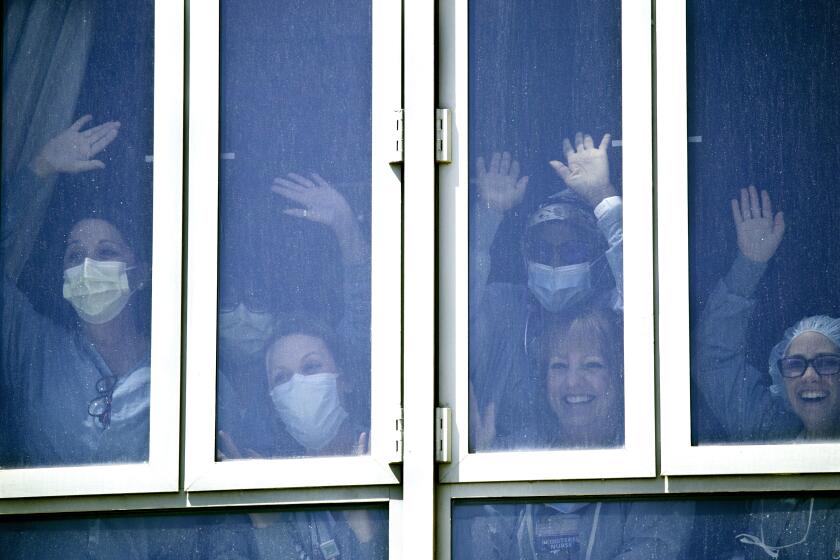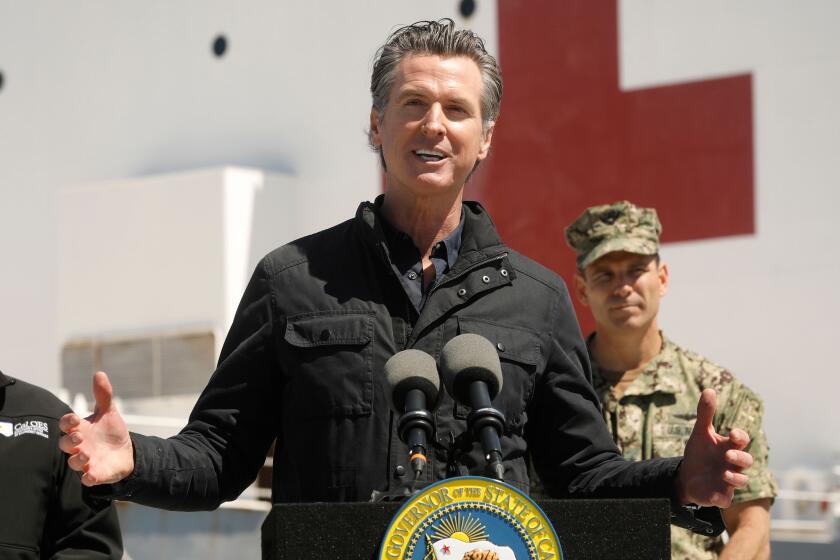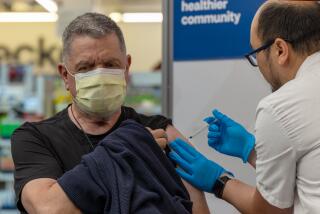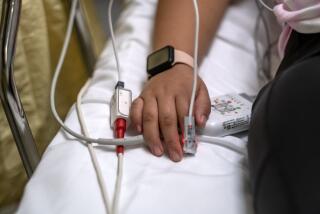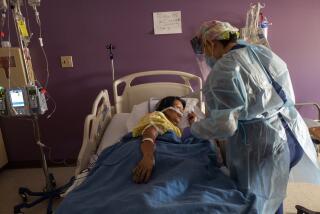Coronavirus strikes California hospital workers hard, including 175 cases at UCLA
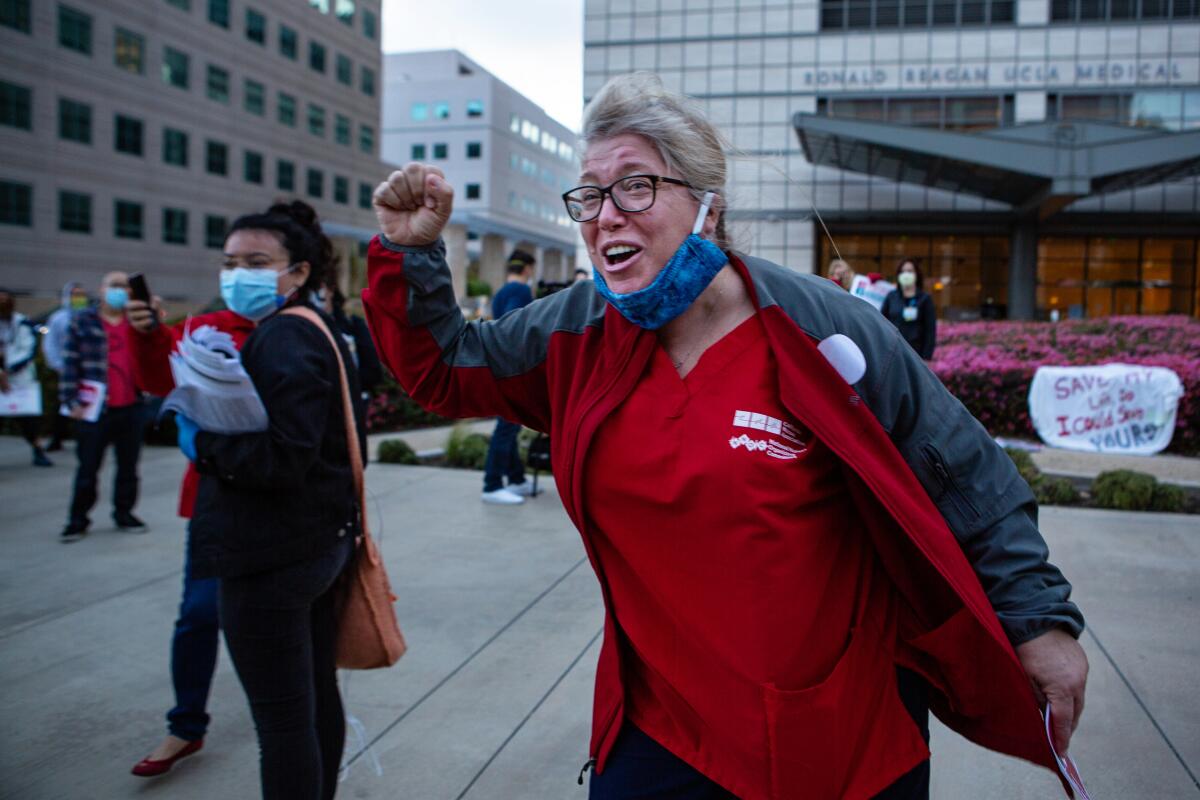
- Share via
The coronavirus has infected California medical workers with much greater intensity than has been publicly revealed, including more than 175 cases at UCLA, according to records reviewed by The Times and a source with knowledge of the situation.
The virus has spread in UCLA’s outpatient clinics, geriatric and labor and delivery units, and in the pediatric intensive care unit, the source said.
The infections at healthcare facilities include at least eight cases involving medical workers at Providence St. John’s Health Center in Santa Monica; 30 at Providence Little Company of Mary Medical Center in San Pedro who are positive or awaiting results; six at the Santa Clara Valley Medical Center in Silicon Valley, including one death; 10 at UC Davis Medical Center in Sacramento; five at Cedars-Sinai Medical Center; and hundreds scattered among numerous elder care and assisted living sites throughout the state.

Firefighters and law enforcement officers from L.A. to Laguna Beach express their gratitude to healthcare workers for their efforts in fighting COVID-19.
“Because hospitals are not being forthcoming with the information on their employees, I am sure there are clusters that nobody even knows about,” said Steve Trossman, public affairs director of Service Employees International Union-United Healthcare Workers West (SEIU-UHW), which represents nearly 100,000 healthcare workers. “That is just wrong for people not to know that their local hospital has an outbreak.”
In multiple instances, the cluster of cases could not be confirmed beyond interviews with administrators, staff and those infected. Hospitals and other medical facilities are not required to disclose known clusters; no law mandates it, and state and county authorities have largely left it to facilities to self-report.
Medical professionals interviewed by The Times suspect staff members may be passing the virus among themselves. In some cases, they said, shortages of personal protective equipment may be an apparent cause. All of the hospitals with outbreaks said their staff has access to appropriate protective gear.
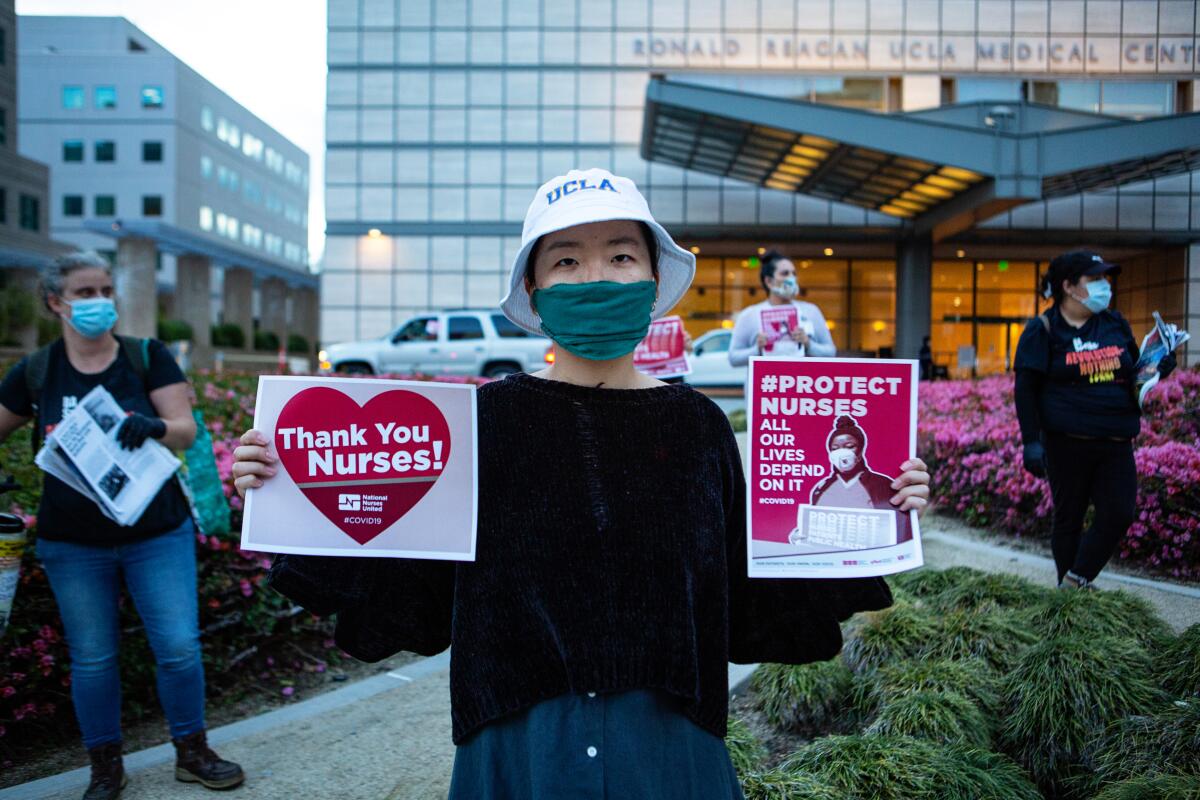
Dr. Mark Ghaly, Gov. Gavin Newsom’s top public health advisor, said Thursday that the well-being of medical workers was “of the highest concern.” But he acknowledged that California does not comprehensively track possible outbreaks at hospitals and other medical facilities and that the state needs to do so.
Ghaly, head of the California Health and Human Services Agency, said the state is in direct communication with only some hospitals when it comes to clusters of cases and doesn’t get reports from every one. When presented with The Times’ general findings, he said the state “absolutely” should receive reports about outbreaks from all facilities.
In the absence of state or local oversight, many facilities — including publicly owned ones such as UCLA — have chosen to remain silent until the toll becomes so great that information can’t be withheld, or whistleblowers come forward.
When healthcare employers provide information about sick staff, they often offer a caveat: There is no way to prove the employee testing positive contracted the illness at work.
Asked how many employees have tested positive for the virus, a spokesman for UCLA Health replied in an email, “I don’t have information for you about specific groups of COVID-positive cases.”
The spokesman noted that UCLA reports data to the county Department of Public Health.
Providence Southern California, which owns St. John’s and Little Company of Mary, said Thursday that it had 49 work-related COVID-19 exposures across its 35,000 employees in 11 hospitals, but it declined to name specific facilities.
Cedars-Sinai spokesman Duke Helfand disputed that the hospital had a cluster of cases but acknowledged that some staff may be affected. He added that all staff were being screened before their shifts. UC Davis declined to say how many workers were infected, citing privacy reasons.
California and its local governments are selective about what information they provide about the coronavirus crisis. What does the public have a right to know, and why is some information being held back?
One blind spot involving the health of medical professionals is the death toll. Though state officials said that, as of April 8, 10 healthcare workers in California had died of causes related to COVID-19, they were unable to say exactly where those deaths occurred.
One of the dead is Valeria Viveros, a 20-year-old medical assistant who worked in a Riverside County nursing home with an outbreak and died last week after contracting COVID-19, according to her uncle, Gustavo Urrea. Urrea believes that healthcare workers should have better access to testing, training and information. When Viveros became ill, her employer sent her home for two weeks but did not offer further help, he said.
“You have to protect these kind of people who are risking their lives, and they are not, they are not doing it,” said Urrea, who described his niece as compassionate and driven to become a nurse.
“She was young and didn’t deserve this,” he said.
A Los Angeles Times data analysis found wide variation in rates of healthcare worker infections across the state, suggesting some regions are having a more difficult time keeping medical staff safe than others.
Officials from California Health and Human Services released the county-by-county data on infections among healthcare workers April 10 at the request of The Times. At that time, the workers accounted for at least 7.8% of the confirmed cases across the state, though that figure could be misleading because some may have easier access to testing than other residents.
As of Wednesday, 2,974 healthcare workers in California were positive for COVID-19, out of more than 26,000 confirmed cases — about 11% of all cases in the state.
The rates of COVID-19 cases involving medical staff examined by The Times varied widely by county, with healthcare workers accounting for about 20% of all cases in Placer and Humboldt counties, for example, but only a fraction of those in Kern and Riverside counties. Los Angeles County, at 6.4%, had among the lowest rates in the state.
County-by-county statistics on the numbers of healthcare workers aren’t readily available, making it hard to understand what the numbers mean to the overall population of healthcare workers in each area.
Among the more than 700 healthcare workers infected in Los Angeles County, about 42% worked in a hospital, according to county health director Barbara Ferrer. About 19% worked in a skilled nursing facility. An additional 11% worked in primary care offices, and about 5% were first responders.
Positive COVID-19 diagnoses are almost evenly split among patients and staff in institutional settings, such as nursing homes and assisted living facilities, according to L.A. County data. Ferrer said Thursday that 1,050 patients in institutional settings have tested positive, as well as 913 staff members.
She was unable to give more detail on where those workers were employed.
“I don’t have that information,” she said. “At this point in time, we’re capturing the information more by the type of job that the healthcare worker is doing and their exposures than we have been capturing it by facility.”
Dr. Christina Ghaly, the head of L.A. County’s Department of Health Services, said people should not worry that a visit to a hospital will result in them being infected with COVID-19.
“Hospitals have very strict infection control guidelines,” Ghaly said in a news conference Wednesday. “I think people should have a high degree of confidence in the ability of healthcare and hospital settings to maintain those infection prevention and control guidelines and keep people safe.”
But those working inside the facilities aren’t as sanguine, and they are increasingly losing trust in the public health officials and administrators charged with protecting their safety and that of patients, especially in light of the shortage of protective gear that many have been forced to work under.
At Santa Clara Valley Medical Center, a large public hospital in Silicon Valley, administrators stayed silent as an outbreak of the virus ripped through nursing staff on a second-floor medical unit. An anonymous whistleblower complained to county officials last week.
By then, six women had become sick; four of them had tested positive and one was dead.
Since then, employees have learned from one another of an outbreak among workers in the boiler room.
“Management has been very hush-hush about it,” said one employee who recently talked to a boiler room operator who had tested positive. “I understand them not wanting to cause hysteria in the hospital. I get that. But I think people who have been exposed have the right to be notified and quarantined.”
The rumor mill about who on the staff is sick runs all day and night, the employee said.
“It’s something we are all talking about, and the frustration is that management isn’t putting anything out to keep us informed, so we have to figure it out,” the employee said.
Maury Kendall, spokesman for the Santa Clara County public health system, said that boiler room employees had been offered testing and that officials were considering changes in how administrators communicate with staff.
“We are currently reviewing our policies and practices in light of the concerns that have been raised,” he said.
Angela Gatdula, a registered nurse at Providence St. John’s Health Center in Santa Monica, tested positive for COVID-19 last week. As the outbreak has grown in Los Angeles County, her ward has become filled with suspected and confirmed COVID-19 patients, excluding those that need to be in the ICU, she said, but nurses have not had access to N95 masks.
Gatdula believes she fell ill while treating COVID-19 patients and wearing a surgical mask. Earlier in the outbreak, the federal Centers for Disease Control and Prevention had been recommending that all healthcare providers wear N95 masks, but it loosened the guidelines recently, in part to stretch limited supplies nationally.
Gatdula said there has been no transparency from the hospital around staff members falling sick. She said there is another nurse on her unit who is also sick, but that nurse informed Gatdula herself — the hospital did not share that information.
“There is a lack of transparency in terms of who are the caregivers who are sick,” she said. “No one knows what’s true, what’s fact.”
More to Read
Sign up for Essential California
The most important California stories and recommendations in your inbox every morning.
You may occasionally receive promotional content from the Los Angeles Times.
